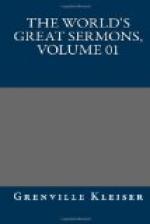I have in these, our assemblies, often uttered partly admonitions and partly reproofs, which I hope the most of you will bear in mind. But since I must presume that now the hearts of all are wrung with a new grief and a new pang by reason of the war in our neighborhood, this season seems to call for a word of consolation. And, as we commonly say, “Where the pain is there one claps his hand,” I could not, in this so great affliction, make up my mind to turn my discourse upon any other subject. I do not, indeed, doubt that you yourselves seek comfort in the divine declarations, yet will I also bring before you some things collected therefrom, because always that on which we had ourselves thought becomes more precious to us when we hear that it proves itself salutary also to others. And because long discourses are burdensome in time of sorrow and mourning, I will, without delay, bring forward that comfort which is the most effectual.
Our pains are best assuaged when something good and beneficial, especially some help toward a happy issue, presents itself. All other topics of consolation, such as men borrow from the unavoidableness of suffering, and the examples of others, bring us no great alleviation. But the Son of God, our Lord Jesus Christ, who was crucified for us and raised again, and now sits at the right hand of the Father, offers us help and deliverance, and has manifested this disposition in many declarations. I will now speak of the words: “No man shall pluck my sheep out of my hand.” This expression has often raised me up out of the deepest sorrow, and drawn me, as it were, out of hell.
The wisest men in all times have bewailed the great amount of human misery which we see with our eyes before we pass into eternity—diseases, death, want, our own errors, by which we bring harm and punishment on ourselves, hostile men, unfaithfulness on the part of those with whom we are closely connected, banishment, abuse, desertion, miserable children, public and domestic strife, wars, murder, and devastation. And since such things appear to befall good and bad without distinction, many wise men have inquired whether there were any Providence, or whether accident brings everything to pass independent of a divine purpose? But we in the Church know that the first and principal cause of human woe is this, that on account of sin man is made subject to death and other calamity, which is so much more vehement in the Church, because the devil, from the hatred toward God, makes fearful assaults on the Church and strives to destroy it utterly.
Therefore it is written: “I will put enmity between the serpent and the seed of the woman.” And Peter says: “Your adversary, the devil, as a roaring lion, walketh about and seeketh whom he may devour.”
Not in vain, however, has God made known to us the causes of our misery. We should not only consider the greatness of our necessity, but also discern the causes of it, and recognize His righteous anger against sin, to the end that we may, on the other hand, perceive the Redeemer and the greatness of His compassion; and as witnesses to these, His declarations, He adds the raising of dead men to life, and other miracles.




